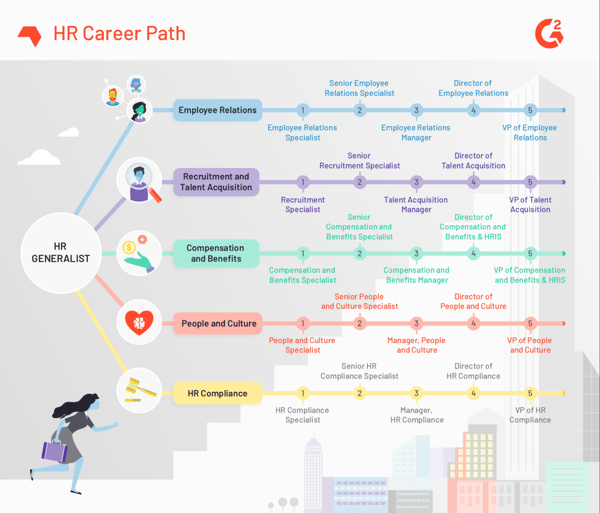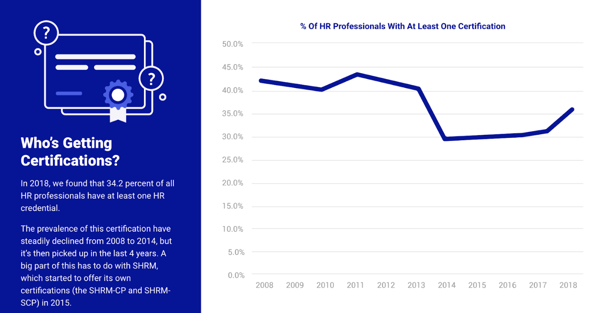Job-hunting is hard, so we’ve decided to make it easier.
Whether you’re fresh out of college or looking to change careers, knowing where to start in your human resources job search can be tricky. There’s so much information about the different types of HR jobs and specialties that it can seem overwhelming for any newcomer.
We’ve decided to do the hard part by putting together a complete guide for finding a job in human resources, whether you're just starting out or if you'd like to become a Chief Human Resources Officer (CHRO). In this piece, you’ll learn more about the different HR career paths, what skills you’ll need for the job, and more.
Looking for specific information about a topic? Use the links below to jump ahead:
How to get a job in human resources in five easy steps
The key to starting your career in human resources is to plan ahead. Being strategic about your approach will save you time and energy as you navigate your HR career path. We’ve put together a simple five-step guide to finding a job in HR to help get things started.
1. Understand how to navigate your career path
What makes human resources such a unique career field is that there are dozens of potential paths your career can take. Unlike most fields where there’s a single trajectory to the top, human resources offers a variety of ways for professionals to land themselves in the C-Suite.
What are the different types of jobs in human resources?
- Compensation and benefits
- Recruitment and staffing
- Training and development
- Employee relations
- Labor laws and legal compliance
- Diversity and inclusion
- People and culture
- HR technology
Knowing where you want to take your human resources career path ahead of time is vital to your success. You’ll save yourself a lot of time by zeroing in on what jobs you’d like to target, what the career ladder looks like, and what skills you’ll need to progress. This is the most important step because it acts as the foundation for everything else.

2. Target the right job titles
Once you know which HR career path you want to target, it’s time to find what jobs you should apply for. Navigating the different HR job titles can be tricky because there are so many of them. Don’t let yourself become overwhelmed by all the information. Focus on the HR career path you decided to pursue and use that as your jumping off point.

Keep in mind that some job titles will vary from company to company. Use the key phrases to explore your options. If you’re looking for a career in compensation and benefits, research different variations of those words on job search websites. This will help you find new positions and jobs to apply for.
3. Research salary data
A big mistake that job hunters make is forgetting to do salary research. Even if you’ve never worked in HR before, it’s important to know what you’re worth. Using salary research websites like Glassdoor or Payscale will help you discover the starting rate for careers you’re targeting.
It’s important to consult several different salary websites because the data will vary from place to place. You can average this data together to find a target range and use that information to guide your job search.
4. Choose the right skills for the job
As with any job, having the right skills will help set you apart from the pack. The tricky thing about human resources is knowing which skills you’ll need. While each HR career path will require different skill sets, there are a handful that can be applied to every human resources career.
Once you’ve got the basics down, you can focus on learning more technical human resources skills, which will depend on what HR field you want to get into. Be prepared to do some research on which skills are in high-demand for your desired job.
5. Use certifications for an edge
Are HR certifications necessary for career success?
This question is still being debated amongst HR professionals in every field. While it’s possible to succeed without one, gaining an HR certification can undoubtedly give you an edge. This graph from Payscale shows the popularity of HR certifications over the last decade:

Understanding the importance of getting certified is one thing: finding the right certification is another. There are countless different HR certification programs you can target depending on where you are in your career, your specialty, and more.
It’s simple really. If you’re up for a job against someone with very similar experience, having the edge that an HR certification provides can help you land the job. While it may be a time and money commitment, many believe it pays off in the end.
Start your job search on the right foot
Congratulations! You have everything you need to start your HR career search. Ready to put what you’ve learned to the test? Click the link below to learn how to write a killer resume that will make hiring managers call you back.

 by Lauren Pope
by Lauren Pope
 by Lauren Pope
by Lauren Pope
 by Lauren Pope
by Lauren Pope